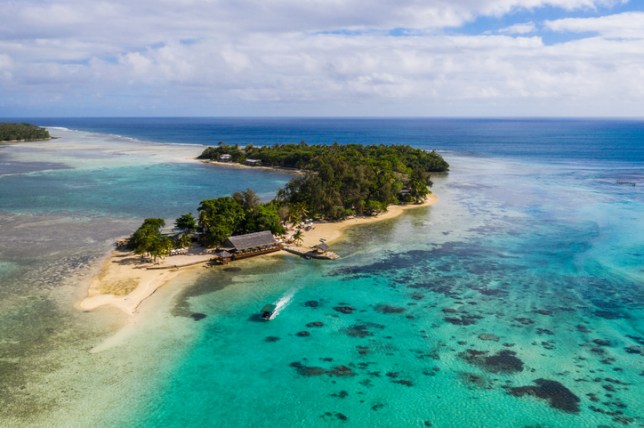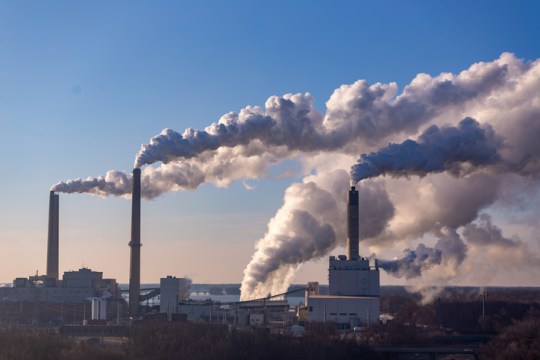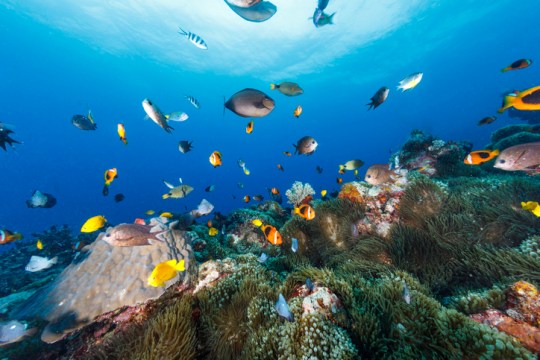Tropical paradise islands in the Caribbean and South Pacific are taking major polluting countries to court in a historic climate justice case to fight ‘the catastrophe unfolding before their eyes’.
Nations including the Bahamas, St Lucia, Tuvali and Vanuatu have launched the action as rising sea levels threaten their existence.
Small island states are responsible for less than 1% of carbon emissions, but are disproportionately affected by the effects of climate change.
In response, the Commission of Small Island States on Climate Change and International Law (COSIS) is asking an international court to determine whether carbon dioxide emissions absorbed by the ocean should be considered pollution.
Under the UN Convention on the Law of the Sea (UNCLOS), most countries are required to take measures to prevent, reduce and control pollution of the marine environment.
The ocean absorbs 25% of all carbon dioxide emissions produced by human activities, but excessive carbon levels in the sea leads to harmful chemical reactions such as acidification and deoxygenation.
In addition, oceans absorb 90% of the excess heat caused by fossil fuel emissions, which causes a number of negative impacts including coral bleaching events and sea level rise – warmer water expands and takes up more space, while melting ice also increased the total volume.
A number of tropical islands, including Tuvalu and Vanuatu, face being completely submerged by the end of the century.
The COSIS hopes that the case, referred to the International Tribunal for the Law of the Sea (ITLOS) in Hamburg, will result in major nations being required to prevent further pollution by reducing carbon emissions. If successful, it will also compel countries to assist in the protection of marine environments already damaged due to emissions.
‘Despite our negligible emission of greenhouse gases, COSIS’s members have suffered and continue to suffer the overwhelming burden of climate change’s adverse impacts,’ said Gaston Alfonso Browne, prime minister of Antigua and Barbuda.
‘Without rapid and ambitious action, climate change may prevent my children and grandchildren from living on the island of their ancestors, the island that we call home. We cannot remain silent in the face of such injustice.
‘We have come before this tribunal in the belief that international law must play a central role in addressing the catastrophe that we witness unfolding before our eyes.’
Small island nations are also at risk of hurricanes and tropical storms which, as the atmosphere warms due to climate change, are becoming increasingly frequent and more severe.
‘Sea levels are rising rapidly, threatening to sink our lands below the ocean,’ said Kausea Natano, prime minister of Tuvalu.
‘Extreme weather events, which grow in number and intensity with each passing year, are killing our people and destroying our infrastructure. Entire marine and coastal ecosystems are dying in waters that are becoming warmer and more acidic.
‘The science is clear and undisputed – these impacts are the result of climate change brought on by greenhouse gas emissions.
‘We come here seeking urgent help, in the strong belief that international law is an essential mechanism for correcting the manifest injustice that our people are suffering as a result of climate change.
‘We are confident that international courts and tribunals will not allow this injustice to continue unchecked.’
MORE : Small islands will ‘choke on plastic’ unless pollution is curbed
MORE : UK’s oldest ponies will help fight climate change
Get your need-to-know
latest news, feel-good stories, analysis and more
This site is protected by reCAPTCHA and the Google Privacy Policy and Terms of Service apply.












